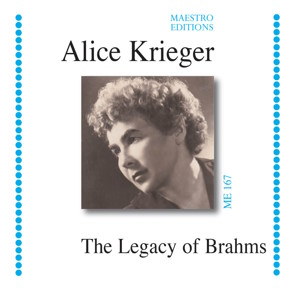
Johannes Brahms (1833-1897)
The Legacy of Brahms
Rhapsody op 79, No. 1 (1879)
Rhapsody op 79, No. 2 (1879)
Rhapsody op 119, No. 4 (1893)
Intermezzo op 118, No. 1 (1893)
Capriccio op 76, No. 1 (1871)
Ballade op 118, No. 3 (1893)
Intermezzo op 118, No. 6 (1893)
Capriccio op 116, No. 7 (1892)
Variations op 21, No. 1 (1857)
Alice Krieger (piano)
rec. 1964, Nola’s Studios, New York
Maestro Editions ME.167 [58]
This is a restoration of an LP made for Lyrichord in New York in 1964. Alice Krieger (1895-1974) was the pianist, then 69, and this is apparently her sole recording session. Roger Smithson’s biographical article about Krieger makes salutary if familiar reading given the context of her life – married, children, Jewish – but it’s worth succinctly considering her place in the pedagogic bloodstream of German music, all the more so as the LP was called ‘The Legacy of Brahms’ and clearly attempted to explore the historic lineage of Brahms’ piano performances on disc.
She was taught by a pupil of Clara Schumann in Karlsruhe Conservatory between 1909 and 1913, her later teachers – the depth of the teaching is apparently open to some doubt – including d’Albert and Schnabel. With marriage and two children she continued her career in Cologne until she left Germany in 1939, eventually reunited with her family in New York in 1945. She thenceforth focused on teaching, though she gave a Carnegie Hall recital in 1951, until her one lasting claim to fame, this single recording session.
The LP was probably recorded on 30 December 1964 in Nola’s Studios without many, if any, retakes. This would account for the occasional smudges in the performances such as in the Rhapsody Op.79/1 where she presses ahead with athletic vitality, somewhat metrically free and flexible, ensuring that reflective contrasting passages are well shaped. Op.79/2 can often sound lumpy and awkward but Krieger marshals the rhetoric well. Op.119 No.4 is notable for the playful quality Krieger extracts after the sturdy outlining of its initial theme. Etelka Freund, who was in the Brahms circle, recorded this too and both women share a positive sense of dynamism, though Freund emerges as the bigger, more vivid player whose playfulness is rather different from Krieger’s – against which it should be said that Freund’s quasi-improvisational approach carries with it unstable rubati but on-the-edge pianism. Krieger, a younger player, is to our ears a much more modern exponent, though not necessary a more compelling one.
Nevertheless, Krieger captures the breadth of the Capriccio Op.76/1 and in the Intermezzo Op.118/6 a revealing comparison with Backhaus can be made. He is much less equivocal than Krieger, sculpting deeper and without any sense of suggestive intimacy; his outlines are more defined, and he is speedier. However, there is something about her playing of the first part of the work that suggests a truly thoughtful player who views it as a narrative to be sculpted and then opened out. Not the only way to approach it, of course, but sometimes the bluffer way is not the only one.
The ‘appendix’ is the Variations, Op.21/1 which is taken from surviving test pressings. Backhaus had recorded it but jettisoned half the work by the simple expedient of omitting repeats; he took 9 minutes in 1936 to Krieger’s 18. The recording here is close and one can hear her pedalling. It’s acceptable for the time, place and rarity of it but her tone is somewhat compromised.
Smithson acknowledges that Krieger didn’t receive first hand tutelage from Brahms – those who did, and recorded, include Ilona Eibenschütz, Etelka Freund (review), Adelina de Lara and Carl Friedberg – and three of these pianists were represented, and the whole Brahms legacy situation explored, in an Arbiter twofer (review) some years ago called Brahms: recaptured by pupils and colleagues and by a single disc called Behind the Notes: Brahms performed by colleagues and pupils (review).
On its first appearance in March 2022, it was found that the disc had been transferred above standard pitch. This was seemingly due to the original LP used but has now been pitch-corrected. It allows us to hear an obscure, overlooked pianist in her only session.
Jonathan Woolf
Availability: Supplier


















